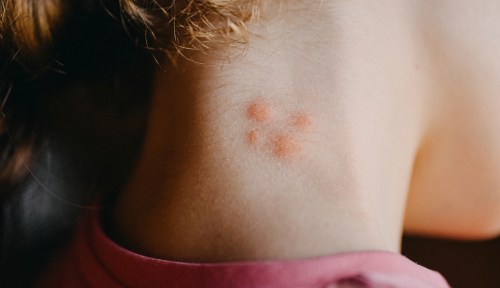Our editors independently select these products. Making a purchase through our links may earn Well+Good a commission
If Mosquitos Love You, Consider Buying Some Different Soap, According to Science
Mosquitos really are attracted to some people more than others. Learn the findings of a new study that asks 'can soap repel mosquitos'?

As someone who comes back “eaten alive” from outdoor events where mosquitos have decided to join the party, it’s infuriating when the people I’m with complain of just one or two bites. At that otherwise lovely dinner al fresco, why was I the mosquitoes’ main course?
Experts in This Article
Recentstudies are validating this uneven experience, showing that mosquitos really are attracted to some people more than others. Researchers think it mostly has to do with a scent wafting from substances called carboxylic acids that are present on a person’s skin, and caused by bacteria. This isn’t something humans notice, and the bacteria isn’t a sign of “dirtiness;” it’s just part of that person’s biology.
But if you’re one of the carboxylic acid afflicted, is there anything you can do? There may be some hope. In a new study published in Cell Press’ iScience, researchers found that soap can interact with a person’s scent, and impact how attractive that scent is to a mosquito.
So, can soap repel mosquitos?
The researchers collected scent samples from unwashed human skin. Then they washed the skin of the same person with four different types of popular soaps—Dial, Dove, Simple Truth, and Native—and collected samples from washed skin. In total, they collected 68 samples.
The study found that mosquitos were more attracted to skin when it was washed with some soaps, and less attracted to skin when it was washed with one soap in particular—Native.
“Out of the four soaps tested here, the Dove and Simple Truth body wash significantly increased the attractiveness of some but not all volunteers, suggesting an interactive effect between the host’s olfactory profile and the soap’s chemistry,” the study reads. “Conversely, Native-washed hosts tended to be avoided, and a significant aversion was observed in the case of the fourth volunteer. Overall, the Native soap biased mosquitoes’ responses in a way that was significantly different from all other treatments.”
Try not to smell like a flower
Allergy and immunology specialist Sandra Gawchik, DO, who was not involved in the study, thought the findings were a much-needed addition to the body of research on mosquito attractants, since information on how to avoid mosquitoes often has more to do with “old wives tales” than science, she says. Dr. Gawchik thinks the fact that the Native soap was coconut based may have had something to do with its efficacy in deterring the blood suckers.
“I thought it was interesting that coconut-based soaps are less likely to be an attractant because the mosquitoes don’t like the smell of citronella, eucalyptus, or of the coconut oil,” Dr. Gawchik says.
The other soap scents may have been more floral, which could attract the mosquitoes, says Dr. Gawchik.
“They’re gonna think you’re a flower or a plant, so you really want to be as natural or as neutral as possible,” Dr. Gawchik says.
Despite these promising findings, there are some caveats . For starters, it was a pretty small study. And the researchers did not infuse the samples with carbon dioxide, which scientists know is what draws mosquitoes to humans. So how the scent samples stand in for a real, bite-able human is not necessarily a one-to-one comparison. Finally, a researcher involved in another study that identified carboxylic acid as a mosquito attractant, Dr. Leslie Vosshall, tells CNN that washing with unscented soap does not have an impact on the acid-causing bacteria’s presence.
But if you’re looking to arm yourself with as many anti-mosquito tools as possible, Dr. Gawchik thinks a coconut-based soap might be a good line of defense. She says, “I think it’s better than nothing.”
Sign Up for Our Daily Newsletter
Get all the latest in wellness, trends, food, fitness, beauty, and more delivered right to your inbox.
Got it, you've been added to our email list.










